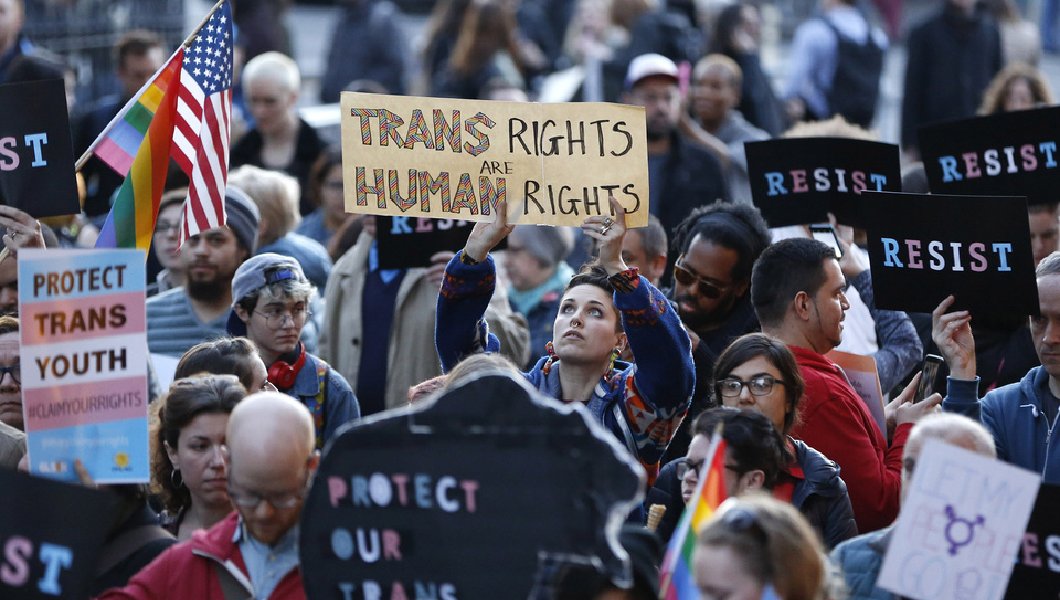According to The New York Times, the Trump administration is considering changing the federal definition of gender as a biological, immutable condition determined by genitalia at birth. This administration has already rolled back recognition and protections for transgender people, and this decision would have the potential to further negatively impact transgender, nonbinary, and intersex people.
The Times reports that the Department of Health and Human Services (HHS) is preparing to issue a memo that gender will be determined “on a biological basis that is clear, grounded in science, objective and administrable.” The memo argues that key government agencies need to adopt an explicit and uniform definition of gender, and the proposed definition would define sex as either male or female. Any disputes about a person’s sex would be clarified by genetic testing.
This change has the potential to seriously harm millions of transgender, nonbinary, and intersex people. HHS is reportedly planning to issue its guidance about the definition of gender by the end of the calendar year, and if the Departments of Labor and Education agree with the language, it will also be rolled out to those federal departments.
If you’re a trans person who is running a crowdfund for any reason, reply to this thread and I will RT it.
Cis people, here’s a tangible, immediate way to support trans people right now in this moment, with your money.
— Katelyn Boo-rns (@transscribe) October 21, 2018
What can we do to help?
If you want to help support the transgender, nonbinary, and intersex communities, here are a few ways you can get started:
- Amplify the voices of the trans, nonbinary, and intersex communities. Especially multiply marginalized trans, nonbinary, and intersex people who are more often left out of conversations and spaces.
- If you have friends or family who are trans, nonbinary, or intersex, check in with them without strings attached. Offer your support in any way that you can—whether that looks like listening to how someone is feeling, coming over to make dinner for them and help them with self-care, or speaking up publicly about trans, nonbinary, and intersex rights.
- Vote. If you’re in an area that’s voting on legislation that impacts the trans, nonbinary, or intersex communities, get out the word. Question 3 in Massachusetts is an excellent example: Tell your Massachusetts friends to vote “Yes” on 3. Spread the word about FreedomMassachusetts.org, donate, and tell everyone you know to show up to vote yes.
- Only work with wedding venues and vendors that respect trans, nonbinary, and intersex clients, and refuse to work with or hire a vendor that doesn’t.
- Read and share resources like this one from Out Magazine, take action, and spread the word on what other people can do to show up as allies.
- Show up for your trans, nonbinary, and intersex communities. When others are spreading misinformation and hate, educate them. Use people’s correct names and pronouns, and correct people who don’t. Make sure that your spaces are welcoming and inclusive—do you have gender-neutral restrooms? Are you asking everyone to share their pronouns at the event, including cisgender people? Are you enforcing gender roles or binarism in your language or actions?
- If you’re in a position to hire someone, whether for an ongoing role or for a project, consider hiring someone who is transgender, nonbinary, or intersex. Recommend that everyone you know does the same.
- Contribute to and volunteer your time to trans-led and intersex-led organizations that are fighting for the rights of trans, nonbinary, and intersex people.
- Consume media—books, articles, movies, podcasts, TV shows, magazines—by and about trans, nonbinary, and intersex people. Support that media with your money or your voice. Tell everyone you know about it. Make sure that children and young adults in your life, especially if they’re trans or intersex, have access to age-appropriate media by and about trans, nonbinary, and intersex people.
- If you’re on social media, share words, tips, and helpful actions that trans, nonbinary, and intersex people have been posting. Signal boost their Patreons, their online shops, their work, their fundraisers.
Featured image via the Washington Examiner






























